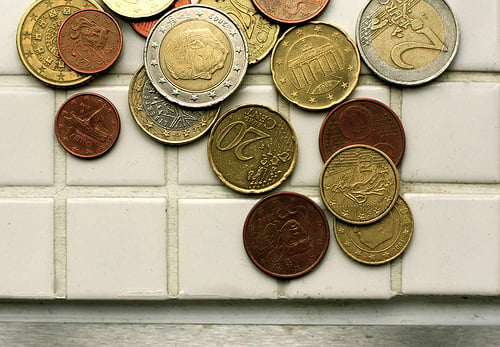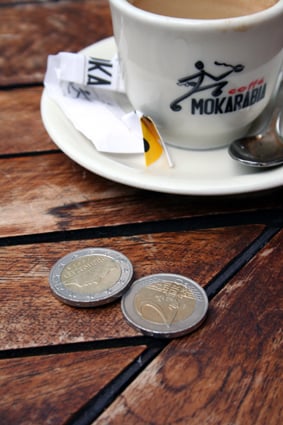Money In Paris

When I started traveling around Europe with a backpack several decades ago, the only thing one needed to make sure you had to have were traveler’s checks. They were easy to buy and widely accepted, no matter where one went. But times have changed and the advent of ATM machines, where you can access money directly from your bank account back home, has changed everything. And credit cards, which most of us migrated to, have become more popular to use when traveling as well as banks have made them more attractive to use when traveling.

So here are my tips for getting money when visiting in Paris. (NOTE: This post was updated in 2019.)
Before you go, make sure you’ll have access to the phone numbers to contact your credit card companies and bank with you, or in a secure cloud-based service. If something happens, you want those numbers handy, especially if you need to cancel your credit card or if you have a problem.
Credit Cards
Visa and Mastercard are widely accepted in France, but merchants or restaurants often won’t accept them unless the amount is over 15€. So it’s a good idea to carry some cash. Although they are supposed to take credit cards now in Paris, some taxi drivers might say their machine is broken, and request that you pay in cash. Services like Uber, Le Cab, and Kaptain, bill you through your credit card. If you are an Uber customer in the United States, your Uber account will work in Paris.
American Express isn’t as accepted in Paris, as it is elsewhere, due to the hefty commission. So if you usually that credit card, best to have a back-up of another, in case you find the establishment doesn’t accept AmEx. Whatever card or service you use, always call your bank before you leave and let them know you’ll be traveling.
If you use a credit card to pay in restaurants and wish to leave a little extra for a gratuity, leave it in cash on the table instead of adding it to the credit card receipt.
Note that not all credit cards are the same when it comes to currency conversion. Some don’t charge fees or points when paying in another currency. If you travel frequently, those kinds of cards are worth investigating. And if a merchant or server in France asks if you want to pay in dollars, or euros, most experts say to pay in the local currency for the best rate.
ATM Cards
Although you might think Paris is a popular, world-class tourist destination, anyone who’s arrived at Charles de Gaulle airport knows that it can be a challenge to find a working ATM. Here’s an account from a traveler’s bulletin board I read recently:
“… we tried to get cash…our ATM cards didn’t work at the only ATM in the arrivals area. We then went to the departures area – same story. We ended up buying euros at the American Express desk, but even there, we had problems – my Amex card and my husband’s Visa card were both rejected. My Visa worked. So, now with some cash, we made our way to the RER to catch the train into Paris. We decided to buy a 5 day Paris Visite pass – now we find that both our Visas are rejected, but my Amex card worked. Go figure.”
Things have gotten better as they’ve been upgrading and renovating the airports in Paris. But it’s nice to have some euros in hand when you arrive. While you don’t need a lot, you might want to get a hundred euros in cash from a currency conversion kiosk or your bank back home. You may have difficulty finding an ATM at a train station in Paris, for security reasons, so don’t expect to find cash machines in them.
Most banks, on both ends, take a hefty chunk when making ATM withdrawals. But you can do a few things to soften the blow: Check with your bank to see if they have an affiliated bank in Paris. Bank of America, for example, has a deal with BNP Paribas and Barclays so you don’t pay ATM fees. Schwab will refund ATM fees on both ends. (Note: Those policies are subject the change. Check with the banks for most up to date information.) Also asking your bank to raise your cash withdrawal limit means you’ll need to make fewer transactions and can save some fees, although you may feel uneasy traveling with a large amount of cash.
Like your credit card, call your bank and let them know you’ll be traveling. And when using ATMs in Paris, keep an eye on your surroundings and guard your security code when you punch the numbers in, even if you’re in a “nice” area, and in broad daylight. Unfortunately, it’s become a more common crime: people get robbed while taking money out of an ATM. (I know, because it once happened to me when I was taking money of out an ATM in the Marais, in broad daylight.)
Usually the thieves are youngsters who wait for you to put it your code, then as you’re just about to withdraw the cash, they run over (beware: it happens very quickly), punch in the highest amount of cash with lightning-fast speed, grab the cash, and run. For that reason, I highly recommend that travelers make ATM withdrawals during bank hours when you can go inside the bank. Because the problem has become rather widespread, some banks in Paris have security guards outside, by the ATMs, so they are safer places to get cash.
Lastly, although it’s tempting to try to spend all your money before departing, I advise keeping some extra cash at the end of your trip for the next time you come. Euros don’t expire and it’s nice to have some on hand for your next trip.
















